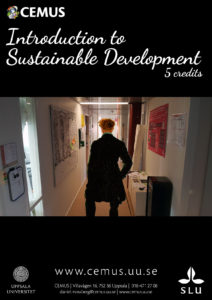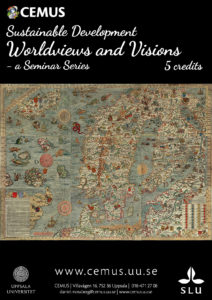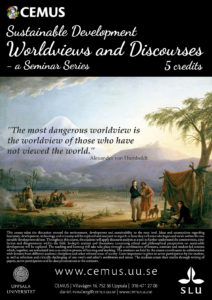Anmälan till vårterminen 2022 stänger vid midnatt 15 oktober.
Läs om hur du söker på www.antagning.se. CEMUS erbjuder följande kurser vårterminen 2022. Direktlänk till ansökan på antagning.se finns på varje kurssida (klicka på bild eller läs mer).
Vårterminen 2022 – Spring 2022
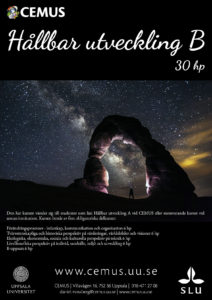 Den här kursen vänder sig till studenter som läst Hållbar utveckling A vid CEMUS eller motsvarande kurser vid annan institution. Kursen består av fyra obligatoriska delkurser: Tvärvetenskapliga och historiska perspektiv på värderingar, världsbilder och visioner 7.5 hp, Ekologiska, ekonomiska, sociala och kulturella perspektiv på teknik 7.5 hp, Livsfilosofiska perspektiv på individ, samhälle, miljö och utveckling 7.5 hp, samt B-uppsats 7.5 hp.
Den här kursen vänder sig till studenter som läst Hållbar utveckling A vid CEMUS eller motsvarande kurser vid annan institution. Kursen består av fyra obligatoriska delkurser: Tvärvetenskapliga och historiska perspektiv på värderingar, världsbilder och visioner 7.5 hp, Ekologiska, ekonomiska, sociala och kulturella perspektiv på teknik 7.5 hp, Livsfilosofiska perspektiv på individ, samhälle, miljö och utveckling 7.5 hp, samt B-uppsats 7.5 hp.Läs mer och ansök»
Teknik, makt och mänsklighetens framtid, 7.5 hp
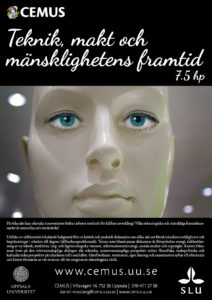 På vilka sätt kan tekniska innovationer bidra i arbetet med och för hållbar utveckling? Vilka teknologiska och mänskliga framtidsscenarier är sannolika och önskvärda?
På vilka sätt kan tekniska innovationer bidra i arbetet med och för hållbar utveckling? Vilka teknologiska och mänskliga framtidsscenarier är sannolika och önskvärda?
Läs mer och ansök »
Livsfilosofi och det moderna samhället, 7.5 hp
 Hur kombinerar man det goda livet med ett ansvar för världen och dess överlevnad? Vad kan olika livsfilosofier och livsstilar i andra kulturer och ur historien lära oss om människan och vår samtid? Vilken roll har individen i dessa tider av kriser, komplexitet och ständiga förändringar?
Hur kombinerar man det goda livet med ett ansvar för världen och dess överlevnad? Vad kan olika livsfilosofier och livsstilar i andra kulturer och ur historien lära oss om människan och vår samtid? Vilken roll har individen i dessa tider av kriser, komplexitet och ständiga förändringar?
Läs mer och ansök »
Master Programme in Sustainable Development
CEMUS is responsible for three course within the programme: Introduction to Interdisciplinary Science, 5 credits (Autumn), Sustainable Development – Worldviews and Visions – A Seminar Series, 5 credits (Autumn), and Sustainable Development – Worldviews and Discourses – A Seminar Series, 5 credits (Spring).
Read more »
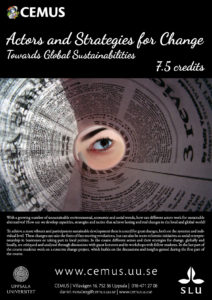 With a growing number of unsustainable environmental, economic and social trends, how can different actors work for sustainable alternatives? How can we develop capacities, strategies and tactics that achieve lasting and real changes in the local and global world?
With a growing number of unsustainable environmental, economic and social trends, how can different actors work for sustainable alternatives? How can we develop capacities, strategies and tactics that achieve lasting and real changes in the local and global world?Read more and apply »
Sustainable Design – Ecology, Culture and Human Built Worlds, 7.5 credits
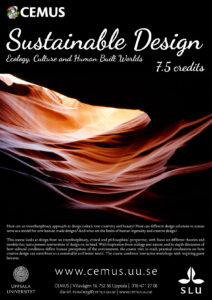 How can an interdisciplinary approach to design unlock new creativity and beauty? How can different design solutions in nature serve as a model for new human made designs? And what are the limits of human ingenuity and creative design?
How can an interdisciplinary approach to design unlock new creativity and beauty? How can different design solutions in nature serve as a model for new human made designs? And what are the limits of human ingenuity and creative design?
Read more and apply »
Perspectives on Climate Change – Ecopsychology, Art and Narratives, 7.5 credits
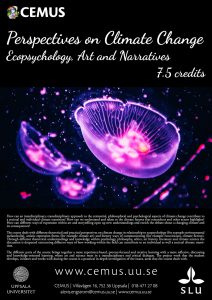 How can an interdisciplinary, transdisciplinary approach to the existential, philosophical and psychological aspects of climate change contribute to a societal and individual climate transition? How can we understand and relate to the climate futures that researchers and other actors highlights? How can different ways of expression within art and storytelling open up new understandings and enrich the debate about a changing climate and its consequences?
How can an interdisciplinary, transdisciplinary approach to the existential, philosophical and psychological aspects of climate change contribute to a societal and individual climate transition? How can we understand and relate to the climate futures that researchers and other actors highlights? How can different ways of expression within art and storytelling open up new understandings and enrich the debate about a changing climate and its consequences?
Read more and apply »
Climate Change Leadership – Power, Politics and Culture, 15 credits
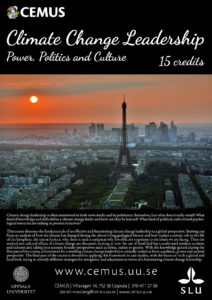 Climate change leadership is often mentioned in both news media and by politicians themselves, but what does it really entail? What kind of knowledge and skills define a climate change leader and how can they be learned? What kind of political, cultural and psychological resources are lacking in present initiatives?
Climate change leadership is often mentioned in both news media and by politicians themselves, but what does it really entail? What kind of knowledge and skills define a climate change leader and how can they be learned? What kind of political, cultural and psychological resources are lacking in present initiatives?
Read more and apply »
Sustainable Economic Futures: Nature, Equity and Community, 15 credits
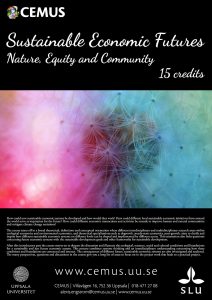 How could new sustainable economic systems be developed and how would they work? How could different local sustainable economic initiatives from around the world serve as inspiration for the future? How could different economic transactions and activities be remade to improve human and natural communities and mitigate climate change emissions?
How could new sustainable economic systems be developed and how would they work? How could different local sustainable economic initiatives from around the world serve as inspiration for the future? How could different economic transactions and activities be remade to improve human and natural communities and mitigate climate change emissions?

